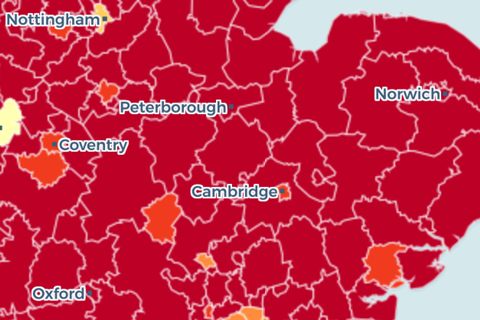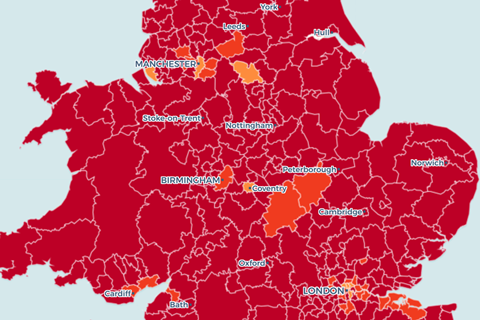Shocking new infographics produced by the Law Society have revealed catastrophic legal aid deserts across the country, with millions of people without access to a provider in key areas such as education, community care and housing.
Using data taken from the Legal Aid Agency’s directory of providers, the interactive maps show that across England and Wales:
- 52m (88%) do not have access to a local education provider
- 47m (79%) do not have access to a local welfare legal aid provider
- 40m (67%) do not have access to a local community care legal aid provider
- 38m (63%) do not have access to a local immigration and asylum legal aid provider
- 23.5m (39%) do not have access to a local legal aid provider for housing advice
Society president I. Stephanie Boyce said: ‘Behind each statistic is a child not getting the education they need, a family facing eviction, fighting for welfare benefits to stay afloat in these turbulent times or a person denied a say in how they are cared for.'
In an accompanying report, the Society provides a detailed explanation of the challenges that are affecting civil legal aid sustainability and viability, and makes several recommendations.
The Ministry of Justice confirmed this month that there are currently 1,401 providers with civil legal aid contracts, compared to 2,129 in April 2012.
| Year | Apr-12 | Apr-13 | Apr-14 | Apr-15 | Apr-16 | Apr-17 | Apr-18 | Apr-19 | Apr-20 | Apr-21 | Sep-21 |
|---|---|---|---|---|---|---|---|---|---|---|---|
|
Providers |
2,129 |
1,811 |
1,700 |
1,785 |
1,697 |
1,601 |
1,448 |
1,560 |
1,497 |
1,435 |
1,401 |
Today’s evidence is the latest in a growing body of material that highlights the fragility of the civil legal aid sector.

After conducting an inquiry into the future of legal aid, the House of Commons justice select committee said in hard-hitting report that sustainability issues for civil legal aid providers were ‘sufficiently serious’ to justify overhauling the system.
The Treasury is due to unveil the outcome of its Spending Review next month. Interest groups, individuals and representative bodies have until Wednesday to submit representations on policy ideas that chancellor Rishi Sunak should consider.
Boyce said: ‘The government must commit in the upcoming spending review to fund the legal aid system properly so that everyone – no matter their background – has access to legal aid when they are entitled to it. This, with measures to address the huge backlogs in civil and criminal courts, would begin to put the justice system on the long road to recovery.’





























24 Readers' comments